15 start with D start with D

A richly detailed graveyard history of the Florentine poet whose dead body shaped Italy from the Middle Ages and the Renaissance to the Risorgimento, World War I, and Mussolini’s fascist dictatorship.
Dante, whose Divine Comedy gave the world its most vividly imagined story of the afterlife, endured an extraordinary afterlife of his own. Exiled in death as in life, the Florentine poet has hardly rested in peace over the centuries. Like a saint’s relics, his bones have been stolen, recovered, reburied, exhumed, examined, and, above all, worshiped. Actors in this graveyard history range from Lorenzo de’ Medici, Michelangelo, and Pope Leo X to the Franciscan friar who hid the bones, the stone mason who accidentally discovered them, and the opportunistic sculptor who accomplished what princes, popes, and politicians could not: delivering to Florence a precious relic of the native son it had banished.
In Dante’s Bones, Guy Raffa narrates for the first time the complete course of the poet’s hereafter, from his death and burial in Ravenna in 1321 to a computer-generated reconstruction of his face in 2006. Dante’s posthumous adventures are inextricably tied to major historical events in Italy and its relationship to the wider world. Dante grew in stature as the contested portion of his body diminished in size from skeleton to bones, fragments, and finally dust: During the Renaissance, a political and literary hero in Florence; in the nineteenth century, the ancestral father and prophet of Italy; a nationalist symbol under fascism and amid two world wars; and finally the global icon we know today.

With clarity and wit, Darwinian Reductionism navigates this difficult and seemingly intractable dualism with convincing analysis and timely evidence. In the spirit of the few distinguished biologists who accept reductionism—E. O. Wilson, Francis Crick, Jacques Monod, James Watson, and Richard Dawkins—Rosenberg provides a philosophically sophisticated defense of reductionism and applies it to molecular developmental biology and the theory of natural selection, ultimately proving that the physicalist must also be a reductionist.

Large technology companies like Meta, Amazon, and Alphabet have unprecedented access to our daily lives, collecting information when we check our email, count our steps, shop online, and commute to and from work. Current events are concerning—both the changing owners (and names) of billion-dollar tech companies and regulatory concerns about artificial intelligence underscore the sweeping nature of Big Tech’s surveillance and the influence such companies hold over the people who use their apps and platforms.
As trusted tech experts Ulises A. Mejias and Nick Couldry show in this eye-opening and convincing book, this vast accumulation of data is not the accidental stockpile of a fast-growing industry. Just as nations stole territories for ill-gotten minerals and crops, wealth, and dominance, tech companies steal personal data important to our lives. It’s only within the framework of colonialism, Mejias and Couldry argue, that we can comprehend the full scope of this heist.
Like the land grabs of the past, today’s data grab converts our data into raw material for the generation of corporate profit against our own interests. Like historical colonialism, today’s tech corporations have engineered an extractive form of doing business that builds a new social and economic order, leads to job precarity, and degrades the environment. These methods deepen global inequality, consolidating corporate wealth in the Global North and engineering discriminatory algorithms. Promising convenience, connection, and scientific progress, tech companies enrich themselves by encouraging us to relinquish details about our personal interactions, our taste in movies or music, and even our health and medical records. Do we have any other choice?
Data Grab affirms that we do. To defy this new form of colonialism we will need to learn from previous forms of resistance and work together to imagine entirely new ones. Mejias and Couldry share the stories of voters, workers, activists, and marginalized communities who have successfully opposed unscrupulous tech practices. An incisive discussion of the digital media that’s transformed our world, Data Grab is a must-read for anyone concerned about privacy, self-determination, and justice in the internet age.

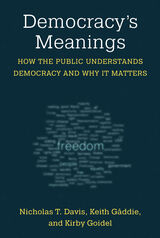
Democracy’s Meanings challenges conventional wisdom regarding how the public thinks about and evaluates democracy. Mining both political theory and more than 75 years of public opinion data, the book argues that Americans think about democracy in ways that go beyond voting or elected representation. Instead, citizens have rich and substantive views about the material conditions that democracy should produce, which draw from their beliefs about equality, fairness, and justice.
The authors construct a typology of views about democracy. Procedural views of democracy take a minimalistic quality. While voting and fair treatment are important to this vision of democracy, ideas about equality are mostly limited to civil liberties. In contrast, social views of democracy incorporate both civil and economic equality; according to people with these views, democracy ought to meet the basic social and material needs of citizens. Complementing these two groups are moderate and indifferent views about democracy. While moderate views sit somewhere in between procedural and social perspectives regarding the role of democracy in producing social and economic equality, indifferent views of democracy involve disaffection toward it. For a small group of apathetic citizens, democracy is an ambiguous and ill-defined concept.
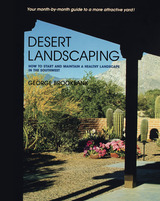
CONTENTS
Part 1 - How to Start and Maintain a Desert Landscape
1. Desert Conditions: How They Are "Different"
2. Plants Are Like People: They're Not Alike
3. Use Arid-Land Plants to Save Water
4. How to Irrigate in the Desert
5. How to Design and Install a Drip Irrigation System
6. Soils and Their Improvement I: How to Plant in the Desert
7. Soils and Their Improvement II: How to Use Fertilizers
8. What to Do When Things Go Wrong: A Troubleshooter's Guide
9. How to Avoid—and Repair—Frost Damage
10. How to Control "Weeds"
11. Palo Verde Borer Beetle: What to Do
12. How to Avoid Texas Root Rot
13. When You Move Into an Empty House
14. What to Do About Roots in Drains
15. How to Dig Up Plants and Move Them
16. How to Have Flower Bed Color All Year
17. Landscape Gardening with Containers
18. Starting Wildflowers
19. Starting a Lawn
20. Making and Keeping a Good Hedge
21. Pruning Trees and Shrubs
22. Palm Tree Care
23. Caring for Saguaros, Ocotillos, Avages, and Prickly Pears
24. Roses in the Desert: Hard Work and Some Disappointments
25. Landscaping with Citrus
26. Swimming Pools: Plants, Play, and Water-Saving
27. Landscape Maintenance While You're Away
28. Condominiums: Common Grounds, Common Problems
Part 2 - A Month-by-Month Maintenance Guide

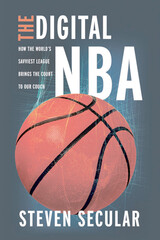
A timely look at a dynamic media landscape, The Digital NBA shows how the games we love became content first and sport a distant second.
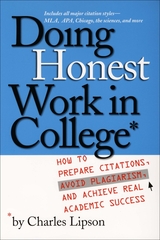
In the first part of the book, Lipson outlines three core principles of academic honesty and explores how these principles inform all aspects of college work. He discusses plagiarism in detail, outlining an ingenious note-taking system and offering guidelines for quoting and paraphrasing. Careful attention is paid to online research, including the perils of "dragging and dropping" text without proper citation. These chapters include numerous tips, all highlighted for students, on how to work honestly and study effectively.
The second part of the book gives a full account of citation styles in the humanities, social sciences, and physical and biological sciences, as well as in pre-professional studies. Filled with examples, these chapters show students exactly how to cite books, journals, edited volumes, Web sites, online publications, and much more—in every citation style imaginable.
By clearly communicating the basic principles of academic honesty and exploring these principles in action, Doing Honest Work in College promotes genuine learning and academic success. This must-have reference empowers faculty and students to address questions about academic honesty before problems arise. It will be the book students turn to for advice from their first class to their final exam.
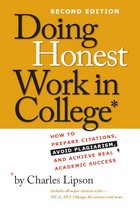
For this second edition, Charles Lipson has updated hundreds of examples and included many new media sources. There is now a full chapter on how to take good notes and use them properly in papers and assignments. The extensive list of citation styles incorporates guidelines from the American Anthropological Association. The result is the definitive resource on academic integrity that students can use every day.
“Georgetown’s entering class will discover that we actually have given them what we expect will be a very useful book, Doing Honest Work in College. It will be one of the first things students see on their residence hall desks when they move in, and we hope they will realize how important the topic is.”—James J. O’Donnell, Provost, Georgetown University
“A useful book to keep on your reference shelf.”—Bonita L. Wilcox, English Leadership Quarterly
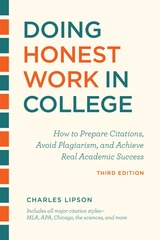
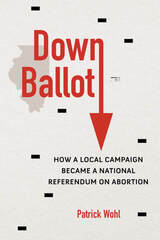
In 1990, a suburban Chicago race for the Republican Party nomination for state representative unexpectedly became a national proxy battle over abortion in the United States. But the hard-fought primary also illustrated the overlooked importance of down-ballot contests in America’s culture wars. Patrick Wohl offers the dramatic account of a rollercoaster campaign that, after attracting political celebrities and a media circus, came down to thirty-one votes, a coin toss to determine the winner, and a recount fight that set a precedent for how to count dimpled chads. As the story unfolds, Wohl provides a rare nuts-and-bolts look at an election for state office from its first days through the Illinois Supreme Court decision that decided the winner--and set the stage for a decisive 1992 rematch.
A compelling political page-turner, Down Ballot takes readers behind the scenes of a legendary Illinois election.

Dr. Golem explores some of the mysteries and complexities of medicine while untangling the inherent conundrums of scientific research and highlighting its vagaries. Driven by the question of what to do in the face of the fallibility of medicine, Dr. Golem encourages a more inquisitive attitude toward the explanations and accounts offered by medical science. In eight chapters devoted to case studies of modern medicine, Collins and Pinch consider the prevalence of tonsillectomies, the placebo effect and randomized control trials, bogus doctors, CPR, the efficacy of Vitamin C in fighting cancer, chronic fatigue syndrome, AIDS cures, and vaccination. They also examine the tension between the conflicting faces of medicine: medicine as science versus medicine as a source of succor; the interests of an individual versus the interests of a group; and the benefits in the short term versus success rates in the long term. Throughout, Collins and Pinch remind readers that medical science is an economic as well as a social consideration, encapsulated for the authors in the timeless struggle to balance the good health of the many—with vaccinations, for instance—with the good health of a few—those who have adverse reactions to the vaccine.
In an age when the deaths of research subjects, the early termination of clinical trials, and the research guidelines for stem cells are front-page news, Dr. Golem is a timely analysis of the limitations of medicine that never loses sight of its strengths.

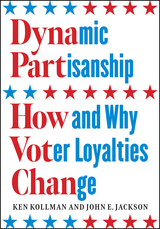
READERS
Browse our collection.
PUBLISHERS
See BiblioVault's publisher services.
STUDENT SERVICES
Files for college accessibility offices.
UChicago Accessibility Resources
home | accessibility | search | about | contact us
BiblioVault ® 2001 - 2024
The University of Chicago Press









